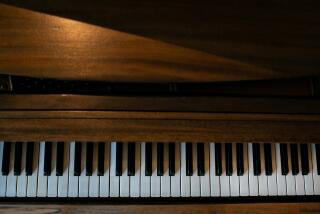‘It’s amazing to see children just begin to blossom . . . .’
- Share via
June Davison began teaching piano when she was 14. For 30 years she traveled across Canada and the United States, giving workshops for teachers and students. At 78, she still gives lessons on two grand pianos in her Burbank home.
I was about 2 1/2 when I first started playing the piano. I had spinal meningitis when I started to walk. The result was, for a long time, I could only crawl. I had crawled myself over to the piano and my mother, who was out in the yard, heard a note here, a note here and a note here. Most kids bang at the keyboard.
She told me this later, that I would push a key down and I would wait until it died completely until I played the next one. So she figured there must be something there that could entertain this youngster because I couldn’t play with the rest of the babies in the neighborhood.
Being handicapped like that, my parents were very much concerned that I was able to keep up with the rest of the kids, mentally at least. Dad was a schoolteacher at that point, a terrific mathematician. He sat me up on the kitchen drain board and made me an alphabet out of newspaper letters and taught me to read, write and spell.
So, when I went to the first grade at 6, I was, as they say today, overqualified. I could read books, spell and write. I ended up skipping the first grade and the first half of the second grade.
When I was a teen-ager, I began to play professionally, doing a lot of accompanying and that sort of work, and I began to work in radio. Radio was just coming into its own. I was a very good sight reader so I got a lot of work in the radio stations in San Francisco and Oakland.
For about two years I traveled all over Northern California accompanying kids for radio auditions. I enjoyed it, even driving home at 4 o’clock in the morning and the fog so thick you couldn’t see your hand out there. I had an Overland, a little four-cylinder coupe that I bought with my own money. My mother would go with me once in a while if it was some distance, but mostly they trusted me.
I was in charge of my life from the time I was 4 years old. I told my mother that I was going to be a musician and I was going to teach. I knew exactly where I was going.
People say, “Why didn’t you aim for a concert career?” I never wanted it. I loved the professional work, playing for singers, violinists and celloists and the radio work. But I had no desire to be a solo pianist. I think the difference came from the way I was raised. My family were of Quaker origin. They were strong on education. That was the motivating purpose of life, education.
I don’t believe that anything that touches a child’s mind should be approached from the angle of fun. Fun is a Greek word that means “fool around,” and I don’t fool around with the mind of a child. I think that everything that goes into that mind must have substance and quality, and it must be something that is taken seriously because, if he doesn’t use his mind, 20 years from now he’s going to be out of luck.
In school they don’t teach kids how to study very much. They give them assignments, and very few children ever learn how to study. I’ve seen kids’ marks in schools go from Cs to Ds up to A’s and Bs in a year of music lessons because I teach them to use their brain. A schoolteacher doesn’t have time with a class of 30 kids to say, “Now look, Johnny, this is what you have to do.” She’s got to tell the whole class what to do. But I do it to one child, and his grades go up.
The kids who study music and study it seriously have the poise, the security and the self-discipline to face most anything. Educators will tell you, whether they make a profession out of it or not is not important; it’s the discipline of the learning process that is reflected in everything else they will do in their lives.
I teach by constantly asking questions, and I get answers. I make the student aware of what he does. It’s amazing to see children just begin to blossom like a flower when you work with them. That’s the satisfaction of being a teacher.
More to Read
Sign up for Essential California
The most important California stories and recommendations in your inbox every morning.
You may occasionally receive promotional content from the Los Angeles Times.













